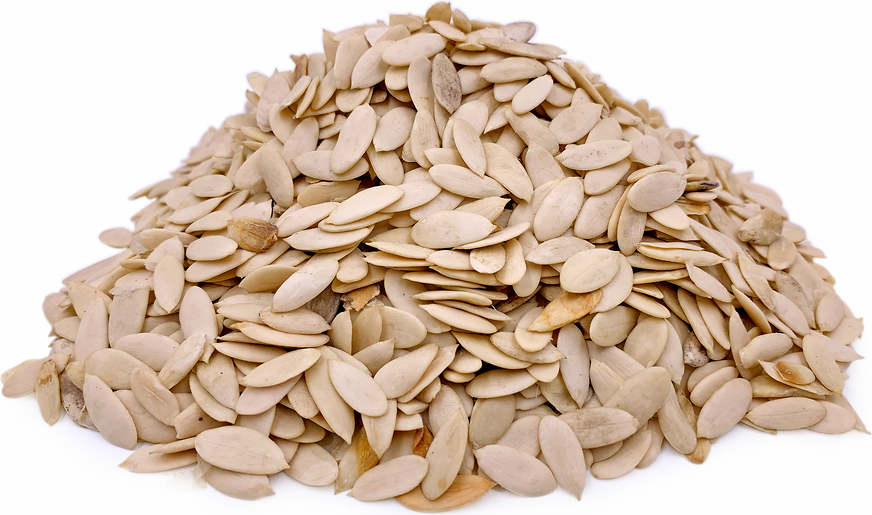


Egusi
Estimated Inventory, lb : 0
Description/Taste
Egusi is a type of gourd that bears a resemblance to watermelon and is primarily valued for its edible seeds. This plant is a creeping annual with hairy stems, forked tendrils, and three-lobed leaves. The Egusi gourd itself is round and oblong, appearing melon-like but larger and denser than most fruits and vegetables. It stands up to 0.5 meters tall with a circumference ranging from 30 to 60 centimeters. Its outer skin is green with lighter, mottled green stripes that are less pronounced than those of a watermelon. The surface of an Egusi gourd is firm and may be slightly bumpy or ridged. When cut open, it reveals a light green, juicy flesh similar in tone and texture to a cucumber. Nestled within this flesh are oval-shaped seeds, typically creamy white in color and similar in size to pumpkin seeds. While the Egusi gourd itself does not emit a distinct aroma, slicing it open may release a subtle earthy and vegetal scent. The flesh of the Egusi gourd is very bitter, sour, and generally inedible, but the seeds are valued for their rich, nutty, and creamy flavor.
Seasons/Availability
Egusi is typically harvested from August to September.
Current Facts
Egusi is a wild gourd that’s closely related to watermelon. It’s botanical classified as Citrullus lanatus var. Colocynthoides and it’s known by various names including Agushi, Gusi Abara, Ibara, Melancia, Pastèque, Wild Watermelon, and West African Watermelon. Particularly popular in Western Nigeria, Egusi seeds are rich in protein and carbohydrates and a staple in the local diet. In Africa, Egusi cultivation is primarily managed by women, which has led to the coining of the term "Egusi wage." Women engaged in the labor-intensive harvesting of Egusi seeds can earn a significant income, which helps improve their standard of living. The Egusi plant is highly resilient to pests and diseases and is often used as a cover crop, interplanted with maize, cotton, coffee, and bananas to maximize agricultural efficiency.
Nutritional Value
Egusi contain 50% oil—78% of which are unsaturated fatty acids, the healthier type of fat. Their composition of 35% protein makes them a good meat substitute for vegetarians. Egusi seeds are rich in vitamin A, supporting healthy bones, and contain vitamins B1 and B2, which are essential for growth and red blood cell production. They contain a high concentration of vitamin C, which aids iron absorption and tissue health, along with Niacin, which is important for maintaining healthy skin. Egusi seeds offer essential minerals like phosphorus and calcium for bone health, magnesium for blood pressure regulation, potassium for muscle function, and iron for oxygen transport in the blood. They contain amino acids such as arginine, tryptophan, and methionine, which enhance cardiovascular health, boost metabolism, and support detoxification. Egusi seeds possess diuretic and tonic properties and have been used to expel intestinal worms.
Applications
Since its flesh is inedible due to its hard and bitter texture, Egusi is primarily consumed for its de-hulled seeds. These seeds can be eaten raw, ground into flour, pressed for oil, fermented, cooked, sauteed, or boiled. When added to sauces and soups towards the end of cooking, Egusi seeds create a curdled, scrambled egg-like texture with a neutral flavor. To extract the seeds, the fruit is cracked open and left to dry. Once dry, the seeds are scooped out and their shells are manually removed. After being roasted and pounded, Egusi seeds can form a paste similar to peanut butter that can be spread onto bread or mixed with foods like kola nuts or eggplant. In Ghana, Egusi seeds are key to making palaver sauce and can also be blended with honey and salt to form a creamy mixture reminiscent of mother’s milk. Egusi pairs well with spinach, tomatoes, okra, bell peppers, yams, chili peppers, onions, beans, beef, goat, fish, shrimp, and crayfish. To maintain freshness, store Egusi seeds in a cool, dry place where they can last up to a year.
Ethnic/Cultural Info
The name Egusi is thought to have origins connected to Yoruba, a major language spoken in Nigeria. The term was later adopted into other languages spoken throughout West Africa and became a shared, common name for the seed. Egusi seeds are notably used in Egusi soup, a nourishing dish featuring leafy greens, vegetables, and dried or smoked fish. The ingredients are combined with red palm oil and seasoned with ginger, thyme, pepper, and curry powder for enhanced flavoring. Egusi soup is popular across West Africa, and each community has its own variation of the preparation. Thanks to their high protein and vitamin content, Egusi seeds are especially useful in areas where malnutrition is common.
Geography/History
Egusi is indigenous to West and Central Africa. It thrives in dry, tropical, and subtropical climates with light, sandy soils that drain water well. Egusi is cultivated in home gardens and small farms throughout West Africa not only for personal consumption but as a valuable cash crop due to its economic and nutritional benefits. This gourd can be found in a variety of settings including cultivated lands, disturbed sites, landfills, shores, and areas around sewage plants. Egusi was introduced to Mediterranean Africa, the Middle East, and West Asia before 1000 BC, reached China around 900 AD, and Japan in the 1500s. Brought to Brazil by Africans in the 1700s and later introduced to the United States after colonization, it is now found in most states as well as Puerto Rico and the Virgin Islands. Egusi's ease of cultivation, pest resistance, soil-improving qualities, and ability to grow in barren areas have made it a viable food source globally, particularly in regions with less-than-ideal farming conditions. While readily available in West African markets, Egusi seeds can also be found in farmer’s markets and West African grocery stores in countries like Germany, England, and the United States.
Recipe Ideas
Recipes that include Egusi. One




